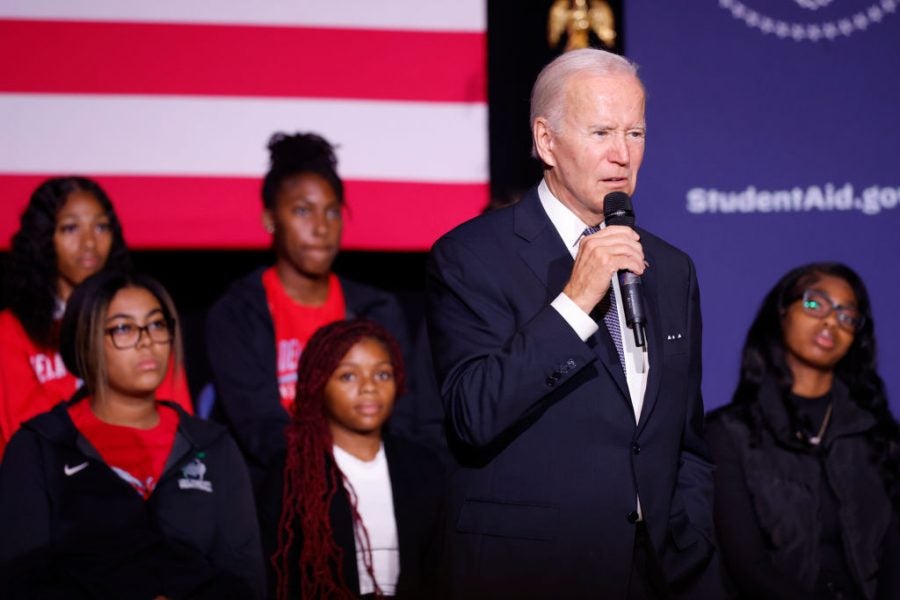
Cashing those $10,000 checks canceling student loans (or $20,000 for some) will have to wait. But, according to advocates, the wait doesn’t have to be long if President Biden uses other authority to cancel the debt.
Last Thursday, a federal judge in Texas (of COURSE) ruled that Biden’s plan was unlawful after two borrowers brought a lawsuit stating they were partially or fully ineligible to have their debt canceled. This is the first time a lawsuit against the program–of the many that have been filed since the plan rolled out– was ruled successfully in favor of plaintiffs.
Prior to the Texas judge’s decision, on Monday, a St. Louis-based federal court extended a different block on the debt cancelation program. On Oct. 21, six states sought to halt the plan, claiming that they would lose tax revenues if the debt is canceled.
Here’s a run-down of the Texas-based lawsuit:
The basics
On Thursday, Nov. 10, a judicial appointee of former president Donald Trump ruled that the debt cancelation plan was unconstitutional. U.S. District Court Judge Mark Pittman said that if the President wants to create a law of vast “economic and political significance, it must have clear congressional authorization.” Pittman, a judge for Texas’ Northern District, said the HEROES Act that Biden relied on for his authority did not provide clear authority for $400 billion in student loan forgiveness.
Some lawyers, however, question Pittman’s reasoning. Just because others benefit from a program, it doesn’t mean the plaintiffs in this case actually suffered an injury, which is a requirement to bring a case before a court. All other judges before Pittman dismissed similar lawsuits because the plaintiffs failed to show how they were injured (i.e. they lacked “standing”).
The plaintiffs
So who are these plaintiffs?
Myra Brown and Alexander Taylor are two former students that, surprise surprise, are backed by the conservative interest group Job Creators Network Foundation. JCNF is described as a”right-wing front group funded by the billionaire co-founder of Home Depot Bernie Marcus and the notorious Mercer Family Foundation, which purports to speak for small-business owners.” The group also supported Trump’s nearly $2 trillion tax cut in 2017.
Oh, and to make matters better, Brown reportedly had her own PPP loan forgiven– almost $48,000 worth according to The Intercept.
What’s next
The Justice Department has appealed Judge Pittman’s decision, and it’s possible the case can make its way to the Supreme Court.
Astra Taylor, co-founder of the Debt Collective, a union representing debtors, argues that it never had to go this far and offer other paths to student loan cancelation.
“President Biden has had two cards he could have played,” she shares with ESSENCE. He could have used authority under the Higher Education Act of 1965, but instead “he played the jack, which is the HEROES authority,” implying it’s a riskier move.
Though it carries risk, it could still be viable, according to Senator Elizabeth Warren (D-MA). “I don’t have any doubt that the president has the legal authority to cancel this student loan debt,” the former presidential candidate said, who campaigned on canceling all student loan debt during her run. “But we have a court down in Texas, and if they’re going to play politics instead of actually following the law, they do put the program at risk.”
Taylor further argues that Biden shouldn’t have required an application to target relief to certain borrowers to begin with, because it bought conservative interest groups time to develop a legal plan of attack. “When you say you’re ‘targeting the worthy’, it just actually leaves out people who need it the most who aren’t on Twitter and don’t have internet access. If they just canceled the debt for everyone, this wouldn’t be happening.”
The Debt Collective created a draft executive order Biden can use. “All Joe Biden has to do is sign [it],” their website says. Taylor also notes that the Biden administration should authorize cancelation immediately without making borrowers wait.
Advocates have also noted the political implications if Biden doesn’t fight for the program. In an op-ed, Taylor notes that Gen Z voters helped block Republicans’ so-called red wave, delivering Biden victories in the midterms.
“Voters under the age of 29 broke for Democrats in overwhelming numbers,” she writes. “Ever since Biden took office, professional pundits have vehemently insisted that canceling student debt would turn off middle-aged, middle-of-the road Democrats, when in fact it drew young people to the polls…This month, young people held up their end of the bargain. Now Biden must honor his.”
She continues:
Biden could knock the legs out from under these cynical lawsuits tomorrow by extinguishing all federal student loans immediately and permanently using compromise and settlement authority. Now that would generate some real “energy and enthusiasm” – the kind of energy and enthusiasm required to sustain and expand this week’s odds-defying electoral success.
With a Georgia Senate run-off still on the table, canceling debt through executive order could still keep young voters engaged, especially the many Black women voters disproportionately burdened by student loans. All Biden has to do is sign it.







